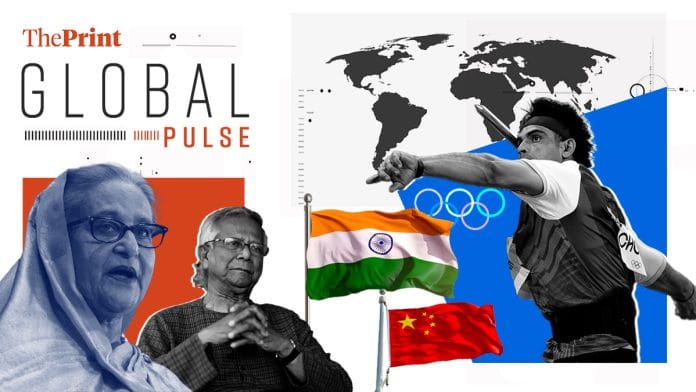New Delhi: A new main road in Mumbai, Dharmveer Swarajya Rakshak Chhatrapati Sambhaji Maharaj Coastal Road, has been helpfully translated for its global audience by The Economist: “Faith-defender, self-rule-protector, umbrella-lord Sambhaji king-of-kings Coastal Road”.
In a piece headlined “Welcome to India, where the streets have four names”, The Economist offers some observational comedy on the Indian penchant for renaming things. Besides translating “Chhatrapati” to “umbrella-lord”, it rightfully takes aim at the Congress party’s lazy and uninspired approach to naming the independent India’s new streets, states, systems. When not naming things after its leaders, the Congress produced “appalling appellations” like NABARD and NREGA, it says.
The BJP coming to power in 2014 promised a breath of fresh air—finally, a political party willing to have some fun with their names. The Economist is particularly fond of the wordplay behind names like AYUSH, UDAN, and MAHARISHI—the latter, it concedes, is a bit of a stretch (MAHARISHI stands for “Millets And OtHer Ancient GRains International ReSearcH Initiative”).
But the BJP has been running rampant. Their version of decolonisation—Hindufying Persian, Mughal, or any vaguely Muslim-sounding names—seems to be losing perspective, according to The Economist. The economic cost of renaming the Indian Penal Code with obscure and obtuse pure Hindi has slowed down an already snail-paced judicial system. “Naming and renaming are part of the warp and weft of government, and of history. But for it to take precedence over practicality betrays a fundamental unseriousness at many levels of government,” the publication writes.
“Every renaming brings fresh confusion. Hours of people’s lives are wasted, with no material gains,” The Economist remarks. “It is an odd way to run a country—whether it’s called India, Bharat or Hindustan.”
And let’s not forget the most recent acronym which took its place in Parliament: The INDIA alliance.
Also read: Global media peeks into India’s trade ties, the Russian ‘secret’ & a semiconductor pact on the cards
If the country is doing anything right, it’s trying to give China a run for its money—but it’s going about it the wrong way, according to global media.
China’s economic slowdown has been a cause for concern for both the Chinese government and global CEOs. But for India, it’s a huge opportunity to finally fill a widening gap — just look at Prime Minister Modi’s diplomatic offensive as he straddled most of Asia over the last week, from Kyiv to Singapore.
But India is held back by “insular trade policies and a “me-first” approach to foreign and security affairs” — and so needs to seize this moment, claims an op-ed in Bloomberg.
“Money talks in geopolitics, and New Delhi has all the right ingredients to match Beijing’s clout, so why is it losing ground?” the piece asks—and then answers. Complex and incoherent domestic politics, religious majoritarianism, and “lukewarm economic engagement” with ASEAN. Investing in the southeast, where China has a head start, is a good first move, it concedes.
Reuters, too, reports that India’s meteoric rise might, in fact, be too much for foreign investors, creating a “dilemma” for global fund managers. Should they “sit back and watch as their relative exposure shrinks while the market grows, or buy in at increasingly eye-watering prices”?
The latter choice is risky, Reuters reports, and so some are funnelling money into smaller Indian companies or looking at other emerging markets. This trend is driven by strong earnings in India while China’s market crumples—however, investors have typically preferred China’s “cheaper and dynamic market, while entry and exit costs for funds can be high in India”.
This has led HSBC and Copley Fund Research to declare India as the “biggest underweight allocation among emerging market funds.”
Unfortunately, the Chinese comparison continues across headlines.
The Financial Times crosses over from the economy to sports, and asks a surprisingly hefty question—‘Why is India so bad at sports?’
In an opinion piece that unpacks why India hasn’t produced more bonafide sporting champions even though it has the people and the money, FT calls India’s recent performance at the Olympics “embarrassing”.
Poverty remains a challenge, the FT deduces. This razor-sharp insight is backed by the fact that India’s economic emergence hasn’t translated into investment in sports. Parents and teachers are more likely to encourage their children to abandon sporting careers and choose safer, viable job options.
“There is a self-reinforcing dynamic here, too,” FT writes. “A lack of national sporting role models (beyond cricket and chess) means the risk-reward ratio for making a living as an athlete continues to look unfavourable.”
It will take time and persistence—the very ingredients of athleticism besides natural ability—to do better at sports. FT suggests India can look forward to the 2028 Olympics, where cricket is set to make a comeback after 128 years.
Meanwhile, a less optimistic word of caution from the subcontinent.
Bangladesh’s new interim leader, Mohammed Yunus, has words of advice for the Indian establishment.
Sheikh Hasina’s political remarks from her safe ensconce in India is an “unfriendly gesture”, The Daily Star reports, referencing Yunus’ first interview to PTI. India should try and keep her quiet—and stop her from commenting on Bangladesh’s recovery attempt. It’s not good for either India or Bangladesh, according to Yunus, and Hasina’s unfettered commentary is causing discomfort.
“The way forward is for India to come out of the narrative. The narrative is that everybody is Islamist, the Bangladesh Nationalist Party (BNP) is Islamist, and everyone else is Islamist and will make this country into Afghanistan. And Bangladesh is in safe hands with Sheikh Hasina at the helm only. India is captivated by this narrative. India needs to come out of this narrative. Bangladesh, like any other nation, is another neighbour,” said Yunus.
Also read: Global media on India’s new tech partnerships & how a ‘bolder fiscal plan’ can power its jobs market






